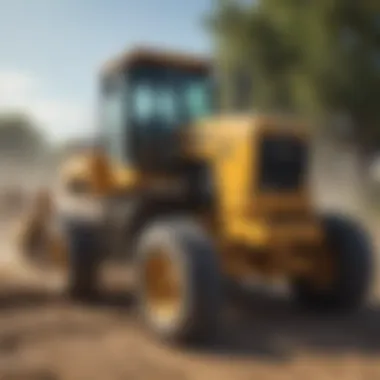Motor Grader Operator Jobs: In-Depth Analysis and Insights


Intro
Motor grader operators play a vital role in the construction and agricultural sectors. Their skillset and expertise contribute significantly to various projects, from road construction to land leveling for farming purposes. Understanding the responsibilities, skills, and industry requirements associated with this role is crucial for individuals aiming to enter or advance in this field. This article will explore key aspects of motor grader operator jobs, analyzing current trends and necessary qualifications.
Research and Data Analysis
In many regions, the demand for skilled motor grader operators has grown. This trend is influenced by several factors, including increased infrastructure projects and the need for updated agricultural practices. Operators must stay informed about national and local trends, ensuring that their methods align with modern demands.
Latest Trends in Construction and Agriculture
The construction industry is increasingly utilizing advanced technology in project management and machinery operation. This shift not only improves efficiency but also raises the required skill level for operators. In agriculture, the integration of technology also includes precision farming, which relies heavily on equipment like motor graders. Thus, understanding how these trends affect operator jobs is essential.
Statistical Insights into Employment Opportunities
Recent data indicates a steady rise in job openings within the sector. The Bureau of Labor Statistics notes that employment for construction equipment operators, including motor graders, is projected to grow in the next few years. The demand correlates with ongoing developments in infrastructure and agricultural practices, making it a strategic career choice for many professionals.
Best Practices and Techniques
To succeed in the role of a motor grader operator, one must adhere to best practices and techniques that enhance productivity and safety.
Efficient Operation of Equipment
It is vital for operators to be familiar with the specific equipment they will be using. Knowledge of various motor grader models allows for efficient operation. This includes understanding the controls, maintenance needs, and operational limits of the machine. Regular training and workshops can provide operators with critical updates and skills enhancement.
Safety Protocols
Safety is paramount for equipment operators. Following safety guidelines reduces the risk of accidents and injuries. Operators should always wear appropriate personal protective equipment (PPE) and conduct thorough equipment inspections before beginning work. Additionally, they should stay informed about local regulations concerning machinery operation in different environments.
Pest and Disease Management
While the focus is often on the operational aspects, there is an intersection between motor grader operation and crop management. This includes the understanding of how land preparation affects pest control and crop yield.
Common Pests and Disease Impact on Operations
Motor grader operators often play a role in preparing land that influences the spread of pests and diseases. Recognizing common threats in crops can help operators and agricultural professionals work together effectively. Routine inspections and proper land preparation can mitigate some risks.
Integrated Pest Management Strategies
Employing integrated pest management (IPM) strategies is beneficial. These can include cultural practices that modify farming techniques to minimize pest populations. Collaboration with agronomists can provide insights on aligning equipment operation with effective pest management.
Prelims to Motor Grader Operators
Understanding the role of motor grader operators is essential for anyone involved in agriculture and construction. This section lays the groundwork by analyzing their definition and critical importance within these industries.
Definition and Role
Motor grader operators play a vital role in maintaining and shaping the earth’s surface. A motor grader, often referred to simply as a grader, is a heavy equipment machine with a long blade used to create a flat surface, primarily in the construction of roads. These operators are responsible for maneuvering this specialized equipment to achieve precise grading and leveling. They must have a firm grasp of the machinery, which includes knowing how to adjust the blade angle and depth for various applications.
Essentially, their role can be viewed as two-fold: operating complex machinery and collaborating with other construction professionals to ensure project success. Their exact duties may vary based on the project, but the overarching responsibility is ensuring a smooth surface that aids in the construction of roads and other infrastructures.
Importance in Agriculture and Construction
Motor grader operators are integral to both agriculture and construction sectors. In agriculture, they help prepare land for farming by leveling fields, which improves the efficiency of irrigation and enhances soil conservation. The importance here extends to ensuring that agricultural practices can be carried out efficiently and sustainably, directly impacting crop yields and farm productivity.
In the construction industry, motor graders are crucial in preparing sites for building. Their work in grading ensures proper drainage and minimizes water pooling, which can cause significant structural issues later on. Additionally, they contribute to road construction, ensuring that highways and byways are safe for public use.
"The motor grader operator is the unseen hero in both agriculture and construction, ensuring that ground is prepared correctly for future developments."
Overall, recognizing the importance of motor grader operators encourages appreciation for their skill set and expertise, which is crucial for successful and efficient operations in both agriculture and construction.
Key Responsibilities of a Motor Grader Operator


The role of a motor grader operator is essential within the construction and agricultural sectors. These professionals perform critical tasks that ensure proper land preparation and road maintenance. Understanding the key responsibilities of a motor grader operator amount to grasping the backbone of various construction projects and agricultural activities. These responsibilities not only involve the operation of intricate equipment but also include site preparation, maintenance, and quality control measures. By fulfilling these tasks, operators contribute significantly to the overall efficiency and effectiveness of their work environments.
Equipment Operation
Motor grader operators are primarily responsible for the operation of motor graders. This heavy machinery is used for creating smooth surfaces on roads and grading land. The operators need to be well-versed in the functionality of the equipment they use. They must understand the various controls and how to manipulate them for different tasks.
A proficient operator can adjust the blade's angle and depth effectively. This adjustment is crucial for achieving the desired finish on a surface. Additionally, the mechanical knowledge to perform basic troubleshooting can prevent downtimes. This knowledge can significantly minimize project delays. Thus, understanding equipment operation is fundamental to a motor grader operator's responsibilities.
Site Preparation and Maintenance
Site preparation and maintenance are critical tasks undertaken by motor grader operators. Before any construction begins, grading ensures that the land is ready for further development. This entails leveling the ground, filling in low spots, and eliminating obstacles. Proper site preparation leads to better outcomes in construction projects, affecting both durability and aesthetics.
Operators often collaborate with surveyors to align the grading with precise specifications. This collaboration ensures compliance with project plans. After construction, operators may return to maintain the integrity of graded areas. Regular maintenance is vital for preventing erosion and damage from weather conditions. It reflects the operator's role in not only initial grading but also ongoing site maintenance.
Quality Control Measures
Quality control measures are an integral part of a motor grader operator's job. They assess the quality of the grading work done and ensure that it meets the required standards. This involves regular checks on the smoothness, slope, and drainage of graded surfaces. Operators may sometimes use laser technology and other measuring devices to guarantee precision.
Effective quality control helps in minimizing future repairs and increases longevity for roads and land. It is crucial for operators to develop a keen eye for detail. They must be proactive in identifying issues before they escalate. Thus, through diligent quality control, motor grader operators uphold high standards in their work and contribute to the overall success of their projects.
In summary, the key responsibilities of a motor grader operator embrace equipment operation, site preparation and maintenance, and quality control measures. Each of these components plays a significant role in ensuring the effectiveness of construction and agricultural projects.
The responsibilities of motor grader operators are demanding and require a blend of technical skills, and practical knowledge. Mastering these can lead to enhanced job performance and satisfaction in this specialized field.
Essential Skills for Motor Grader Operators
Motor grader operators play a pivotal role in the construction and agricultural industries. To perform effectively, they require a unique set of skills that enhance their performance and ensure safety. These essential skills not only enable operators to manage complex machinery but also to respond to varied situations on the job site. Understanding these skills provides insight into the competencies necessary for success in this field.
Technical Proficiency
Technical proficiency is the backbone of a motor grader operator's effectiveness. Operating a motor grader involves understanding the controls and mechanics of the machine. Operators must learn how to adjust the blade angle, control the speed, and manage the motor grader’s hydraulic systems. A strong grasp of these technical skills is vital for achieving precision in grading tasks.
Moreover, operators should be familiar with maintenance routines. This knowledge helps in identifying and troubleshooting issues before they escalate. Preventative maintenance ensures the equipment runs smoothly and reduces downtime. Overall, technical proficiency translates to safety and efficiency on the job.
Spatial Awareness and Judgment
Spatial awareness is another critical skill for motor grader operators. This skill allows them to visualize the terrain and determine how to adjust their machinery accordingly. It involves understanding distances, angles, and the topography of the land. Accurate spatial judgment is crucial when grading roads or preparing sites.
Operators must also gauge the potential impact of their actions. For instance, they need to consider how changes in elevation may affect drainage patterns. Good spatial awareness results in better decision-making, minimizing mistakes that could lead to costly repairs or project delays.
Problem-Solving Abilities
Problem-solving abilities are essential in this line of work. Operators frequently encounter unforeseen challenges, such as rough terrain, weather effects, or equipment malfunctions. Being able to analyze the situation and devise a practical solution quickly is vital.
For example, if a grader encounters a large rock, the operator must decide whether to remove it or adjust the grading plan. Effective problem-solving skills allow operators to keep projects on track and maintain workflow. These skills add significant value to their role and ensure that tasks are completed efficiently.
"The combination of technical knowledge, spatial awareness, and problem-solving skills defines the success of a motor grader operator. As these skills deepen, so does their impact on work quality and safety."
Training and Certification Programs
Training and certification are vital components in the professional landscape of motor grader operators. These elements not only prepare individuals for the rigors of the job but also enhance their employability in a competitive market. Proper training ensures that operators are not only skilled in operating the machinery but also understand the safety protocols and operational standards required in construction and agriculture settings.
Requisite Education
A minimum level of education is often necessary to secure a position as a motor grader operator. Many employers prefer candidates who have completed high school or possess a GED. Subjects like mathematics and mechanics are particularly beneficial, laying foundational knowledge for operating grading equipment effectively. Community colleges and technical schools may offer specialized programs, focusing on heavy equipment operation, which is an asset when entering this field.
Moreover, having a solid understanding of the principles of construction and agriculture can greatly assist in the job. A background in these areas helps in grasping the practical applications of motor grading in various projects.
On-the-Job Training
While formal education provides a base for aspiring motor grader operators, on-the-job training is equally crucial. Many companies provide hands-on training where novices work alongside experienced operators. This phase is where theoretical knowledge meets practical application. Operators learn about the specific equipment they will be using, along with the best practices for safe operation.


Additionally, on-the-job training helps in developing essential skills such as time management and teamwork. It allows new operators to familiarize themselves with the unique challenges on different sites. Weather conditions, soil types, and project specifications vary widely; therefore, adaptability becomes a critical aspect of the job.
"On-the-job training helps you understand how to adapt to each unique job site, enhancing your skills effectively and safely."
Certification Bodies and Their Importance
Certifications are an effective way to demonstrate proficiency in motor grader operation. Several recognized bodies offer credentialing programs, such as the National Center for Construction Education and Research (NCCER) and the Associated General Contractors of America (AGC). Achieving certification indicates that an operator has met industry standards and possesses the necessary skills for safe and efficient equipment operation.
These certifications not only increase job prospects but also have the potential to lead to higher salaries and advancements in career. Employers are more likely to hire operators with recognized certifications as they represent a commitment to the industry and a level of expertise that can be trusted.
Job Market Analysis
Understanding the job market for motor grader operators is crucial for several reasons. It provides insights into demand, growth potential, and overall stability in the field. By examining current trends and conditions, future operators and industry stakeholders can better position themselves for success.
Current Job Outlook
The job outlook for motor grader operators can vary based on a range of factors. Currently, the construction and agricultural sectors show stable demand for skilled operators. According to the U.S. Bureau of Labor Statistics, opportunities in this occupation are expected to remain steady, particularly in areas with large construction projects or expansion initiatives. As infrastructure projects increase, there will likely be a corresponding rise in the need for motor grader operators to contribute to these efforts.
In addition, the rise in technological advancements means operators may need to adapt to new machinery and methods, possibly influencing the job availability in the sector. This transition can either make the role more essential or reduce the demand for traditional grading, depending on how technology evolves.
Regional Demand Variations
Regional job demand for motor grader operators is often influenced by local economic conditions and prevailing agricultural practices. Key factors include:
- Infrastructure Development: Urban areas or regions focusing on construction often offer abundant opportunities.
- Agricultural Needs: In farming communities, operators may be in higher demand during planting and harvesting seasons, largely based on the regional climate and crop cycles.
- Economic Fluctuations: Some regions experience variable economic conditions, impacting construction projects and the need for operators.
For example, states like Texas and California may experience a higher demand due to ongoing large-scale projects, while rural areas can see fluctuating needs based on agricultural cycles.
Industry Trends Affecting Employment
Several industry trends significantly impact employment in the motor grader operator field. These include:
- Technological Advancements: Newer, more efficient machines are becoming standard. Operators who can handle GPS-guided or automated graders may find themselves in higher demand.
- Sustainability Efforts: As industries push towards sustainable practices, operators may need to adapt to new methodologies that focus on environmental stewardship.
- Economic Investments: Government spending on infrastructure can lead to a temporary boom in demand, shaping employment trends significantly in the short and medium term.
Understanding these industry trends provides critical insights into how the job market for motor grader operators may evolve in the coming years. It allows potential operators to prepare for changes and align their skills with market needs.
The ability to anticipate changes in demand for motor grader operators can prepare individuals for a dynamic and rewarding career.
Salary Expectations and Benefits
Discussing salary expectations and benefits is crucial for anyone considering a career as a motor grader operator. This information not only helps prospective operators set realistic financial goals but also informs current professionals about their market position. Understanding compensation packages, including salary and additional benefits, enables motor grader operators to make informed career decisions.
Average Salary Range
The average salary for motor grader operators varies significantly depending on several factors. According to recent data, salaries typically fall within a range of $40,000 to $70,000 annually. Factors like experience, location, and the industrial sector heavily influence this range.
"A skilled operator in a region with high demand can earn upwards of $80,000 per year."
In urban areas or regions with heavy construction activity, salaries tend to skews higher. For example, states like California or Texas might offer salaries significantly above the national average, while rural areas usually provide lower compensation due to the lesser demand for such specialized skills.
Factors Influencing Compensation
Compensation for motor grader operators is not fixed and can fluctuate based on multiple elements:
- Experience Level: More experienced operators command higher salaries due to their proven skills and efficiency.
- Location: Regional demands significantly affect salaries. In areas with ongoing construction or agricultural projects, operators can expect better pay.
- Industry Type: Operators in the construction industry often earn more compared to those in agriculture due to the equipment's heavy usage in urban development projects.
- Certifications and Training: Those who have completed advanced training programs or certifications might negotiate a higher salary, as their skills can add extensive value to their employer.
Workplace Benefits
In addition to salary, it is important to consider the benefits that accompany motor grader operator positions. Common workplace benefits might include:
- Health Insurance: Many employers offer comprehensive health plans, covering medical, dental, and vision expenses.
- Retirement Plans: Employers may provide 401(k) matching options, encouraging operators to save for their future.
- Paid Time Off: Vacation days, sick leave, and holiday pay are standard benefits that enhance job satisfaction.
- Training Opportunities: Continued education or workshops on new techniques and technologies may also be part of the benefits package. This allows operators to stay updated and improve their skill set, which can lead to career advancement.


Understanding these expectations and benefits will help potential motor grader operators to assess job opportunities more effectively. By focusing on both salary and benefits, they can find positions that not only meet their financial needs but also support their overall well-being.
Work Environment and Conditions
Understanding the work environment and conditions of motor grader operators is essential to grasping what this role entails. This section provides insight into the settings where these professionals operate, along with the challenges they often encounter. These insights not only highlight the practical aspects of the job but also underline some of the critical factors that can influence job satisfaction and performance.
Typical Work Settings
Motor grader operators work in various settings, most commonly found on construction sites, farms, and road maintenance departments. The terrain can vary greatly, affecting how the operators use their machinery. Often, they are situated outdoors, which provides a unique perspective on the tasks they perform.
- Construction Sites: Here, graders are used for leveling ground, forming bases for roads and buildings. Operators must coordinate with other machinery and workers effectively.
- Agricultural Fields: In farm settings, graders help maintain roadways and drainage systems. Operators monitor the earth's condition, ensuring optimal soil management.
- Road Maintenance: In this context, motor graders are crucial for upkeep. Operators work on highways, local roads, and rural paths to maintain surface integrity and manage drainage.
Working outdoors means exposure to varying weather conditions. This can extend from hot summer days to cold, rainy conditions that can complicate operations.
Challenges Faced on the Job
The role of a motor grader operator is not without its challenges. Understanding these can help in assessing both the physical and mental demands of this profession.
- Weather Impact: Unpredictable weather can lead to unsafe work conditions. Rain can make sites muddy and difficult to navigate, while extreme heat or cold can affect the operator’s performance and safety.
- Technical Issues: Machinery can often face technical issues, requiring operators to troubleshoot or conduct minor repairs. Familiarity with these machines is essential.
- Physical Demand: Operating a grader requires a significant amount of physical stamina. Operators are often required to be seated for long periods and must maintain focus while maneuvering large machinery.
- Coordination with Teams: Communication is crucial as operators frequently work alongside other construction and maintenance teams. Miscommunication can lead to accidents or project delays.
"The work environment for motor grader operators can significantly affect their job performance, satisfaction, and safety. Understanding these elements promotes better preparation for potential operators in this field."
In summary, motor grader operators face a multifaceted work environment that is rich in opportunities and challenges. By comprehensively understanding these conditions, prospective operators or those interested in this niche can better prepare for what this career entails.
Career Progression Opportunities
Career progression opportunities for motor grader operators are vital in understanding the long-term potential in this profession. This topic is significant as it highlights how operators can evolve within their careers and the potential benefits that come with advancement. A clear path can motivate individuals to develop their skills and foster their professional growth within the construction and agricultural fields.
Advancement Paths
Motor grader operators often start their careers in entry-level roles, involving basic operation and maintenance of equipment. As they gain experience and refine their skills, they can move into more advanced positions.
- Senior Operator: After a few years of experience, operators may take on more challenging tasks, including overseeing projects or training new staff. This role requires a deeper understanding of operations and site management.
- Site Supervisor: Operators who demonstrate leadership abilities and good judgment may advance to site supervisor management roles. Here, they oversee teams of operators, ensuring that all equipment is used effectively and safely, as well as managing the day-to-day operations on site.
- Project Manager: For those who wish to further their career, moving into project management is an option. This role encompasses broader responsibilities and requires an understanding of project planning, budgeting, and human resource management.
Advancement within this field is not just about years served but also about continuous learning and adapting to new technologies and practices.
Specializations within the Field
Specializing can provide motor grader operators with unique prospects and expertise that can lead to greater job satisfaction and financial rewards. Some common specializations within the field include:
- Grading Techniques: Operators may choose to specialize in specific grading techniques, which can apply in various environments such as highways, residential developments, and construction sites.
- Terrain Management: In this specialty, operators focus on effectively and efficiently managing different terrains, optimizing conditions for construction or agricultural use.
- New Technologies: With the rise of technological advancements in machinery, operators can become specialists in operating modern, GPS-enabled motor graders, which can improve precision and efficiency.
Operators who decide to specialize often find that it allows them to command higher salaries and enjoy increased job security.
"Continuous skill enhancement is crucial for anyone looking to thrive in motor grader operations, as the industry is ever-evolving."
Ending and Further Reading
In the realm of construction and agriculture, motor grader operator jobs hold significant importance. As the article outlines, these professionals contribute to essential processes in land leveling, road construction, and maintenance. Understanding the multifaceted nature of this role allows potential operators and industry stakeholders to appreciate the depth of skill and responsibility required.
Summarizing the key findings from the previous sections, we note that the position necessitates not only technical proficience but also cognitive abilities such as spatial awareness and problem-solving skills. Training programs vary, ranging from formal education to on-the-job training, ensuring that operators gain both foundational knowledge and practical experience. The job market demonstrates a steady demand for skilled operators, with regional variations reflecting specific agricultural and construction needs. Salary expectations are aligned with experience, location, and the complexity of tasks performed. Therefore, exploring these elements informs prospective operators about potential career pathways and earnings, which is vital for strategic career planning.
"The role of a motor grader operator is integral to successful project execution in agriculture and construction."
For those interested in advancing their careers as motor grader operators, it is essential to keep abreast of industry trends and opportunities for specialization. The potential for advancement exists not only within operational roles but also into supervisory and management positions. Glancing towards further reading can provide invaluable insights into these opportunities.
Key Points
- Motor grader operators are crucial in construction and agriculture.
- Technical skills, spatial awareness, and problem-solving are essential.
- Training and certification play a significant role in readiness for the job market.
- Regional demand varies but overall job outlook is positive.
- Salary expectations can greatly differ based on various factors.
References for Additional Information
To deepen your understanding of motor grader operator jobs and explore further information, the following resources are recommended:
- Wikipedia: Motor Graders
- Britannica: Heavy Equipment Operator
- Reddit: Construction Careers
- Facebook: Construction and Agriculture Groups
These resources can provide additional perspectives and data that enrich the knowledge of professionals and enthusiasts alike.















